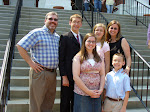
I'm going to record a bunch of quotes from C.S. Lewis's Prayer: Letters to Malcolm (I bought my copy in England; in the US, I think it was published under the title, Letters to Malcolm, Chiefly on Prayer) that I've been reading. I'll write the quote, then make some comments on it. Here's the first one.
Speaking about the liturgy of the Church of England, Lewis writes:
And it [the liturgy] enables us to do these things best -- if you like, it 'works' best -- when, through long familiarity, we don't have to think about it. As long as you notice, and have to count, the steps, you are not yet dancing but only learning to dance. A good shoe is a shoe you don't notice. Good reading becomes possible when you need not consciously think about eyes, or light, or print, or spelling. The perfect church service would be one we were almost unaware of; our attention would have been on God. (Letter I)
This introduced me to the idea of a church service as a means to an end, not an end in itself. Our worship services should be just that: worship services, not concerts, performances or club meetings. The problem is that very few churches, it seems to me, make a conscious effort to do this. We are very - sometimes VERY - focused on keeping people entertained, keeping them coming back, keeping them happy, or whatever. In this sense, I'm afraid many of our worship services are functionally atheistic; if God wasn't there, I'm terrified to admit that many of us wouldn't notice. He simply isn't the focus.
[I should be careful to explain that when I say "our worship services," I'm not necessarily referring to the church where my family happens to be attending right now in our lives. In fact, our worship pastor works hard at getting people in touch with God, at making people aware that we are to be encountering God during these services.]
I've internalized Lewis's idea here and applied it to worship leaders and so-called "worship bands." I think very few people who are "worship leaders" are really gifted at it; they too often need to be the center of attention. "Worship bands" too often try to dominate the worship. More often than not, "less is more." Recently at the school where I teach, we had a break from the usual rock group worship band, and instead, a small ensemble of singers stood on risers and sung some accapella numbers. I was surprised at my response; I got all teared up. In thinking about it later, I realized that what moved me was the beauty of the music. Rock bands are rarely beautiful, though they are often loud.
I've also started to think that worship leading is a spiritual gift. Perhaps we should work harder at identifying people who have this gift, instead of anointing anybody who has a "worship band" as a "worship leader."
Here's my personal dilemma: I am from a "low church" worship tradition, but that tradition doesn't seem to be giving me the intellectual / spiritual food to sustain my worship of God on Sundays. I find myself thinking about many things other than God. The service is "predictable," as Lewis wants, but the forms of worship that sustain the intellect don't seem to be present. On the other hand, the "high church worship" churches I know of are usually theologically liberal, so I can't very comfortably change churches.
As a compromise, I've been attending a local episcopal church on Sunday mornings, one that has a service late enough that I can still teach SS at my church and attend most of the worship service; I slip out of our service early and drive quickly to this other church where there is very traditional Anglican worship. I'm not quite comfortable enough with the liturgy to "not notice it," but I'm getting there. Besides that, the beauty of the worship is very compelling.
In any case, Lewis, many years ago, introduced me to the idea that our worship services are not only (though they are partly) for preaching, but also for worship, and they do that best when we aren'y always wondering what is coming next. But, for my part, I also need some intellectual fodder (which the BCP provides) and beauty.






No comments:
Post a Comment